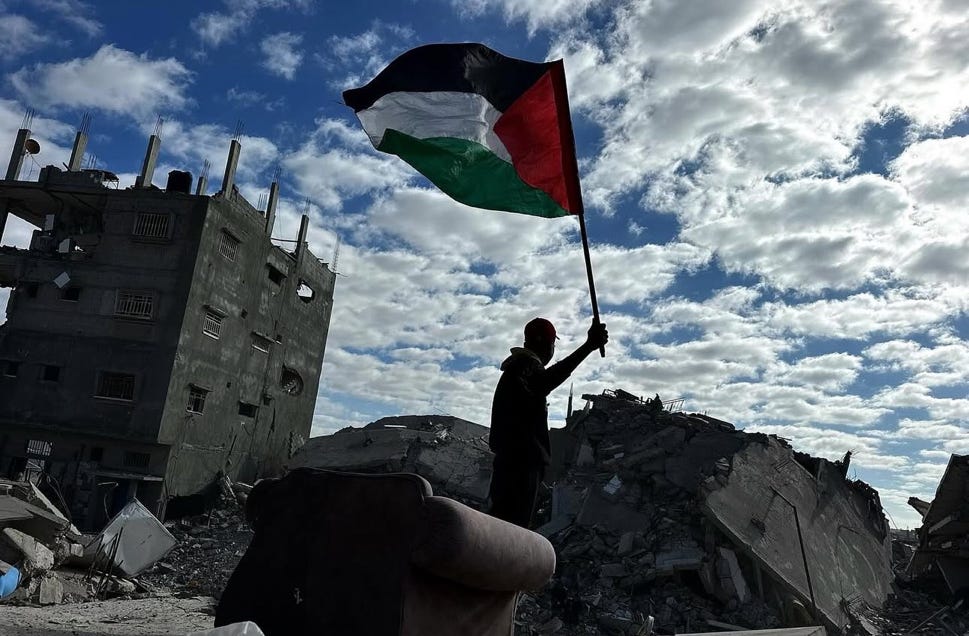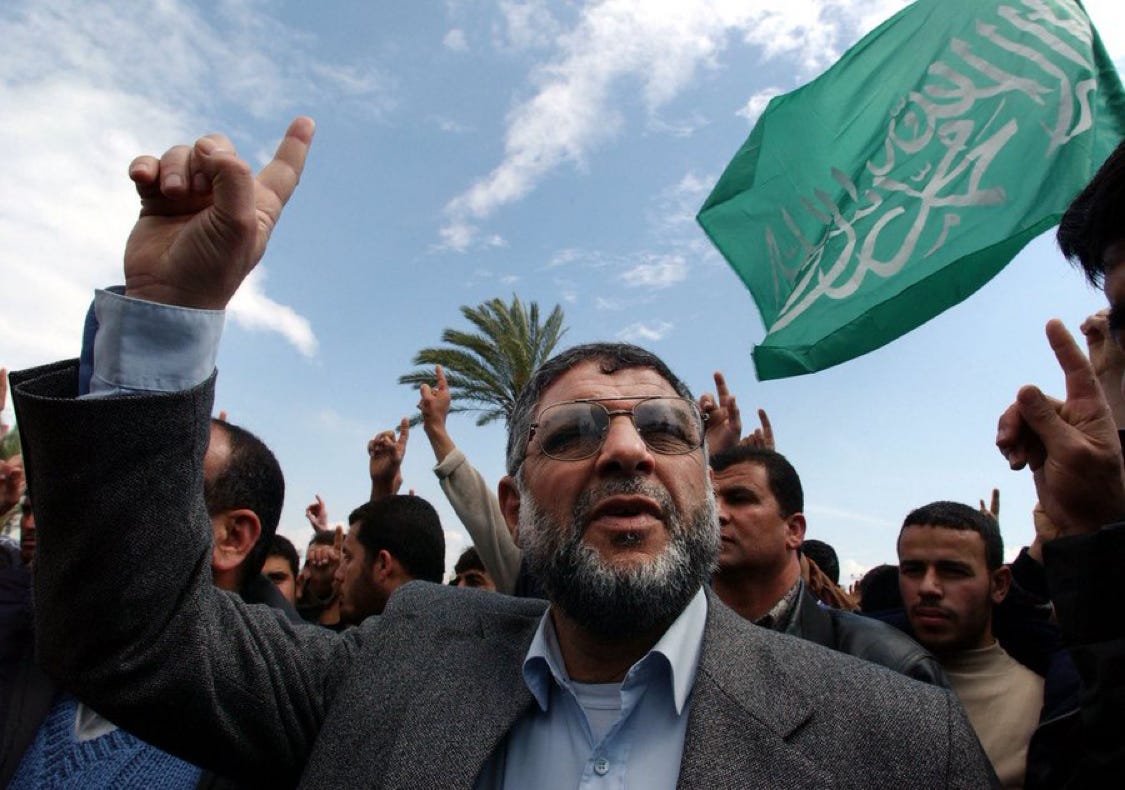Israel Repeatedly Rejects Hamas Ceasefire Offers
For more than two decades, Hamas has offered Israel long-term truces (hudna) in exchange for ending the occupation. Every offer has been rejected.
From DropSite News:
April 28, 2025
Israeli officials have told local media there is “no chance” the government will accept Hamas’s latest proposal—a five-year ceasefire that would end the war on Gaza, allow for reconstruction, and secure the release of all Israeli captives. Instead, Israel is planning for ways to prolong the assault.
Here are five key things to know from the latest reports today:
1. Israel Rejects 5-Year Truce and Captive Release Deal
➤ Israeli officials told Yedioth Ahronoth and Times of Israel they will not agree to a hudna (truce) that would allow Hamas to “rearm, recover, and continue its war.”
➤ Hamas’s proposal, as confirmed by Drop Site News and Israeli media, offered to release all Israeli captives in Gaza in exchange for ending the war, a full Israeli withdrawal, reconstruction, and humanitarian aid.
➤ Israel refuses any deal that would halt its military campaign without “dismantling Hamas,” demanding disarmament—a red line for Hamas.
2. Netanyahu’s Government Prepares to Expand Gaza Assault
➤ Instead of advancing a deal to bring captives home, Israel’s security cabinet is reportedly convening again this week to discuss expanding military operations in Gaza (Maariv).
➤ This follows a weekend of extensive Israeli terror bombings in Gaza and prolonged siege conditions, with no clear plan for ending the war or securing captives’ release.
3. Hostage Families Blast Israeli Government for Having “No Plan”
➤ The Hostages and Missing Families Forum condemned Israel’s rejection of the truce proposal, releasing this statement:
“Once again the ‘senior political source’ proves that the Israeli government has no plan. The prime minister and his representatives continue to explain what they are not willing to do to bring the hostages home – while at all costs avoiding presenting a clear plan for what they are willing to do.”
➤ Family members have repeatedly accused Netanyahu of abandoning the captives to prolong the war.
4. Israel Moves to Collapse Gaza’s Economy and Advance Deportation Plans
➤ An Israeli official has proposed efforts to collapse Gaza’s economy, including a proposal to cancel NIS 200 banknotes to choke Hamas’s finances, claiming Hamas holds up to 5 billion shekels ($1.3 billion) in cash.
➤ The same official confirmed Israel’s ongoing push for forced relocation of Palestinians from Gaza.
➤ Canada and other Western countries have reportedly asked to evacuate Palestinians of Gaza who are citizens of theirs and their family members, and Israel claims it will allow those “willing to leave.”
➤ Meanwhile, Gaza’s economy is in freefall, with Israel blocking aid trucks for months—a tactic Israeli officials say presents a “serious opportunity to collapse Hamas.”
5. Israel Blames Qatar for Breakdown in Hostage Talks
➤ Israeli officials accused Qatar of undermining negotiations by urging Hamas to reject Egyptian ceasefire proposals (Times of Israel).
➤ Qatari Prime Minister Sheikh Mohammed bin Abdulrahman Al Thani dismissed Israel’s accusations that Doha sabotaged negotiations, calling them “baseless propaganda” and part of the broader “Qatargate” campaign aimed at discrediting Qatar’s mediation role. He reaffirmed Qatar’s commitment to the talks and pointed to Israel’s refusal to end its military campaign as the main obstacle to a deal.
➤ An Arab official (not Qatari) denied the claims, calling them “manufactured” by Israel to deflect blame from Netanyahu’s government for the failure of the talks.
April 26, 2025
Israel has a long history of rejecting Hamas long-term ceasefire offers to prolong its illegal occupation.
For more than two decades, Hamas has offered Israel long-term truces (hudna) in exchange for ending the occupation. Every offer has been rejected.
Today, Hamas has begun presenting mediators with a comprehensive plan for a five-year truce to end the war in Gaza—offering major concessions.
The resistance movement has not officially released details of its latest ceasefire proposal, but according to Al-Araby Al-Jadeed, which cites Egyptian sources and a senior Hamas official familiar with the negotiations, the plan includes:
➤ Full Israeli withdrawal from Gaza, with a short, guaranteed timeline backed by mediators.
➤ Release of all Israeli captives, dead and alive, in exchange for ending the war.
➤ A five-year truce with all reconstruction restrictions lifted, based on Egypt’s Arab League-backed plan to rebuild Gaza over 3-5 years.
➤ Hamas steps down from Gaza’s civil administration, including the police. An interim committee, formed and trained by Egypt (with background checks on personnel), would govern.
➤ Resistance weapons remain, but Hamas offers guarantees: arms won’t be used if Israel adheres to the deal, and no new military infrastructure (including tunnels) will be built near Gaza’s border during the truce.
➤ Aid distribution will be monitored by third parties, including the American security firm that oversaw the January 17 ceasefire, as well as tribal leaders unaffiliated with Hamas to ensure aid reaches civilians and counters Israeli claims of diversion.
Despite major concessions, Hamas’s leadership maintains:
➤ No to disarmament of the resistance.
➤ No to partial deals without full guarantees.
The idea of a hudna is not new, as reported in Jeremy Scahill’s latest story on the negotiations. Hamas has suggested such arrangements for decades—and Israel has rejected every offer. Let’s walk through that history.
2. 1997 | Sheikh Ahmed Yassin’s Offer
Shortly after his release from Israeli prison, Hamas founder Sheikh Ahmed Yassin offered a 10-year truce if Israel withdrew from the territories occupied in 1967, released Palestinian prisoners, and allowed a Palestinian state.
In Egypt’s Al-Ahram, Yassin said:
“Let’s solve this problem now on the basis of the 1967 borders… Let’s leave the bigger issue for future generations.”
3. 1997 | 30-Year Truce Offer
Former Mossad chief Ephraim Halevy later confirmed Yassin had made an even broader offer—a 30-year truce—through Jordanian mediators.
Israel rejected it. Seven years later, Yassin was assassinated.
4. 1999 | Memorandum To Europe
In a memorandum sent to European diplomats in 1999, Hamas’s leadership presented in explicit terms a long-term truce in return for:
1. Israeli withdrawal from the West Bank and Gaza.
2. Evacuation of all illegal settlements.
3. The release of all Palestinians held in Israeli prisons.
4. Recognition of the right of the Palestinian people to self-determination.
5. 2004 | Rantisi Continues Offer
After Yassin’s assassination, Abdel Aziz Al-Rantisi briefly led Hamas. He reaffirmed the long-term truce offer, sticking to the pre-1967 borders as the basis.
He was assassinated by Israel just weeks later.
6. Post-2006 | Meshaal & Haniyeh Reiterate Hudna
After Hamas won the 2006 Palestinian elections and took over Gaza’s governance, leaders Khaled Meshaal and Ismail Haniyeh continued offering a hudna: a Palestinian state within 1967 borders, no recognition of Israel, but long-term calm.
Hamas made similar long-term offers again in 2008 and 2014.
Israel rejected all of them.


7. Hudna in the New York Times
Senior Hamas adviser Ahmed Yousef wrote in the New York Times in 2006 that a hudna is a binding Islamic contract aimed at achieving a permanent, nonviolent resolution.
He compared it to the IRA’s peace process in the north of Ireland—where arms were decommissioned without recognizing British sovereignty.
“This offer of hudna is no ruse… During this period of calm and negotiation, we can address important issues like the right of return and the release of prisoners.”
8. 2017 | Hamas Charter
In 2017, Hamas updated its charter, offering a Palestinian state within the 1967 borders, reiterating its hudna approach.
The charter maintained the right to armed resistance but offered a political resolution based on the pre-1967 map.
Netanyahu responded by mocking and dismissing the offer—calling it “fake news” and theatrically throwing the document into a trash bin.
9. Refusing Peace
For more than 25 years, Hamas has repeatedly offered long-term truces. Israel has rejected them—choosing occupation, siege, and war instead.
Today’s five-year hudna proposal is just the latest chapter.
Read more in Jeremy Scahill and Jawa Ahmad’s latest for Drop Site News:












